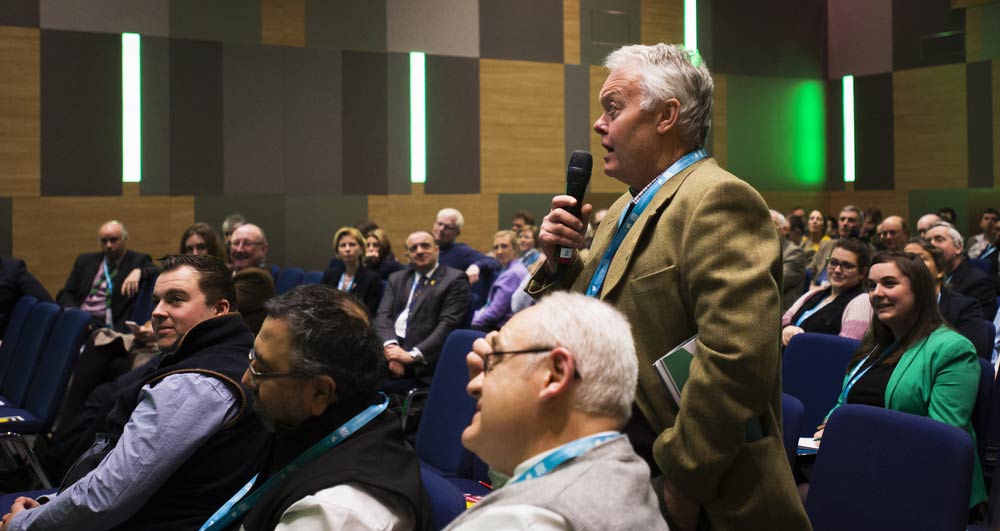Chief Superintendent Bill Dutton of Cheshire Police, who deputises for the National Chief Police Council’s (NPCC) national lead for wildlife crime and rural affairs, talked about setting up a dedicated rural crime team. He said that he presented a "passionate business case" for £500,000 of extra resources to focus on rural crime, and their police commissioner put up the council tax precept to pay for it.
It was a popular session, showing why rural crime is a rapidly developing policy area for the NFU. In 2017, the NFU launched the Combatting Rural Crime Report, and this was used to inform NPCC strategy that was launched in 2018 – making the NFU the only rural organisation involved in many of the government’s policy areas surrounding rural crime.

The NFU’s Land Manager Chief Adviser Sam Durham highlighted hare coursing and fly tipping as specific focus areas, where the organisation has worked with the police, magistrates and government to offer training on the impacts and the best ways to prosecute.
The session included Dr Kreseda Smith and Dr Richard Byrne of Harper Adams University, who shared the top rural crime concerns and launched a survey that looked into the psychological impacts of being victims of rural crime, which the NFU urged farmers to complete.
Dr Smith said: “The psychological impact of farm crime not only affects the farmer, but also to wider family, friends, workers, and community. It is time for academic researchers to treat this as a serious issue affecting farmer mental wellbeing.”

There is also a growth in the production of counterfeit pesticides, with criminals changing their modus operandi by becoming familiar with the farming calendar and producing the chemicals they know will be required at the correct time of year.
Dr Byrne said that livestock thefts were becoming increasingly organised across the country and it was "no longer a matter of taking one for the pot". He said:"They are stealing sheepdogs, they are stealing trailers and they are stealing larger numbers of sheep really quickly."
Dr Byrne went on to say that activists were increasingly using social media to isolate individual farms to target. The NFU's chief legal adviser Nina Winter said: "There are lots of different types of activists and there is a spectrum of what activists do, ranging from campaigning through to lawful peaceful protest, but there are also some activists who break the law."
Ms Winter said that activism was not just about animal rights, but could encompass environmental, climate change, and even local activism – usually focused on planning issues. She said that the NFU was working on a number of ways of supporting our members affected by activism, including developing an online hub of advice for members. We are also looking to lobby for changes to the law, including where drones are worrying livestock.
See also: Read more from NFU Conference here
Call Crimestoppers to give information 100% anonymously
- Report rural crimes to the police, or give information 100% anonymously to the dedicated Rural Crime Hotline run by the charity Crimestoppers, in partnership with the NFU.
- Anyone can contact the line by calling 0800 783 0137 to speak to a trained agent or online at www.ruralcrimehotline.co.uk.
Take a look at the links below to get advice and find out more:
The room heard how the NFU has raised the profile of rural crime up the political agenda, and action has taken place by organising the first NFU Anti-Fly-tipping Group.
The organisation issued a guide to preventing and reporting crime, which can be downloaded here, and explained how it had set up partnerships to help NFU members, offering discounts and advice on security products such as NextBase, Datatag, Bushnell, Tracker and more. View the range of security discounts exclusively for NFU member here.
It has also worked with Crimestoppers regarding rural crimes, and in the second half of last year were related to industry fly-tipping. Attendees of the sessions were encouraged to call the NFU’s Rural Crime Hotline, which is free and anonymous, on 0800 783 0137 if they have information about a crime on their farm or in their area.
Member Robert Lockhart described how Birmingham City Council's charge on collecting garden waste had led to increased fly-tipping on his farm.
See more of our coverage from NFU Conference 2020:
- NFU elects officeholder team
- NFU20: British farm standards must be the benchmark in future trade deals
- NFU20: Defra Secretary George Eustice talks flooding, ELMs and food standards
- NFU20: Business backs British standards
- NFU20: How we are inspiring our nation's schoolchildren
- NFU20: Leicestershire farmer honoured for grassroots commitment
- NFU20: Safeguarding our food and farming standards
- NFU20: Climate change is the challenge of our time
- NFU20: Putting IPM at the top of the agenda
- NFU20: Beyond the CAP - the future of farm support
- NFU20: Animal health and welfare - protecting and improving our reputation
- NFU20: Psychological impacts highlight the importance of combating rural crime
- NFU20: How can technology break through the barriers facing the arable sector?
- NFU20: An ambition for growth in horticulture
- NFU20: Learning lessons for the UK's sugar beet production
- NFU20: Livestock session busts myths on meat
- NFU20: Poultry's positive position to farm without barriers
- NFU20: Promoting, growing and protecting British dairy
In case you missed it, here are some easy ways to catch up with the highlights from both days at the ICC, Birmingham:
